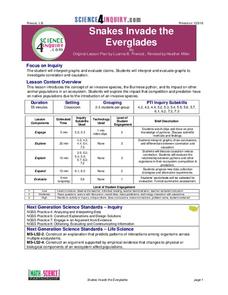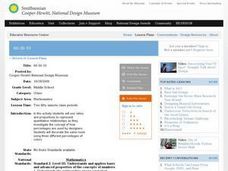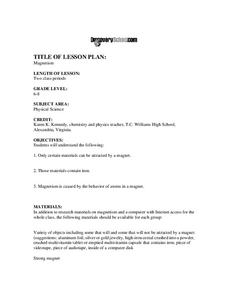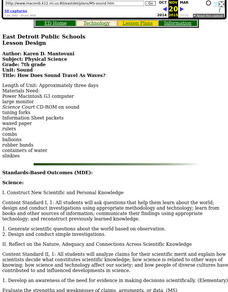Curated OER
Should We Allow New Mining in the Upper Peninsula?
Learners compose an essay taking a position on whether or not a proposed
mine near Marquette, MI should be opened. Students defend their position addressing relevant issues through factual supporting details. Their essay includes an...
Cornell University
Fibers, Dyes, and the Environment
Nanofibers can be made through electrospinning or force spinning in order to reduce the negative impact on the environment. Pupils study the role of fibers and dye on the environment through a series of five hands-on activities. Then,...
Personal Genetics Education Project
DNA, Crime and Law Enforcement
Civil rights meets biotechnology in a instructional activity that scrutinizes the collection of DNA of citizens who have been arrested, but not yet convicted of a crime. Real-life cases are examined in which the DNA of a relative was...
Science 4 Inquiry
Snakes in the Everglades
The Burmese python is on the loose ... and he's hungry! Illustrate the differences between causative and correlative relationships through an inquiry instructional activity. Pupils examine several sources of information to determine if...
Curated OER
Perceived Risks
Students rank a list of everyday risks to compare with classmates. They rate each risk on both its ability to be controlled and its observability in the environment. Results are graphed.
National Endowment for the Humanities
Kennewick Man: Science and Sacred Rights
"Have respect for the dead!" Scholars investigate how science and religion often clash. As they look into the laws of science and the laws of religion, the legal ramifications at the federal level of both play into an argument they...
Curated OER
Unit 2: Global to Local: Understanding My Place in the Hydrosphere
What does the ground around your home have to do with water pollution? Young ecologists learn about their local watershed and create their own cause-and-effect models of the hydrosphere.
Chicago Botanic Garden
Accessing Prior Knowledge: Global Climate Change Survey
Begin a unit on weather and climate change by assessing prior knowledge of the topic. Learners respond to a survey with questions that ask what they think causes climate change, the effects of climate change, and if it is important to...
Chicago Botanic Garden
Reflecting on What I Learned About Climate Change
After three eye-opening lessons about our environment, scholars revisit a 10-question survey, reflect on their new-found knowledge, and take action by writing to a representative or creating a public service announcement about climate...
Curated OER
60-30-10
Middle schoolers use ratios and proportions to represent quantitative relationships as they investigate the concept of how percentages are used by designers. Students decorate the same room using three different percentages of colors.
Curated OER
Can You Do It?
Middle schoolers create a simple machine to help with the design of the traditional can opener. For this simple machines lesson plan, students analyze the can opener, and use the design process to solve problems.
Curated OER
Ziplock Chemistry
Students investigate various chemical reactions when creating mixtures in ziplock baggies. In this chemistry lesson, students will recognize various chemical reactions and cite evidence. Safety and assessment strategies are included in...
Curated OER
Magnetism
Young scholars experiment with the concept of magnetism. Working in small groups, students design an experiment to test the magnet attraction of various substances. After completing their experiments, young scholars research magnetism...
Curated OER
Investigating Electrical Circuits
Sixth graders draw and construct a complete circuit. In small groups they develop a list of questions about electricity, listen to a teacher-led lecture, construct a complete circuit, test circuits, and create an illustration of a...
Curated OER
Hazard Mitigation: Bioterrorism
Learners discuss different ways to spread infectious diseases. In this bioterrorism lesson, students model the rate of smoke emission using CalRoad software. They analyze the effects of airborne release of biological...
Curated OER
How Does Sound Travel As Waves?
Seventh graders participate in a number of activities designed to increase their understanding of how sound is generated and how it travels.
Michigan Sea Grant
Exploring Watersheds
Collaboratively, students partake in a hands-on activity in which they build models of a watershed. Each group member draws an elevation map—a bird's eye view—of their model and predicts how water will flow from the high to low points....
Curated OER
Lippmann vs. The Testers: Can Intelligence Be Measured?
Students examine the ideas of Walter Lippman and standardized testing. They discover the ideas and beliefs behind using standarized tests. They examine a copy of an IQ test and discuss.
Curated OER
Planning a Tourist Resort
Students work in teams of 2 to complete the presentation portion of the assignment. They may be required to work alone or may work with their partner to complete the "Board Member's Responses."




















